Eric Bailey (above), the keynote speaker at the American Association of State Highway and Transportation Officials 2023 Annual Meeting in Indianapolis, presented a warning of sorts to the state DOT community: “We are losing our ability to communicate with one another.”
[Above photo by AASHTO]
Bailey – president of human communication consulting firm Bailey Strategic Innovation Group and the bestselling author of “The Cure for Stupidity: Using Brain Science to Explain Irrational Behavior” – explained that, in today’s world, people’s perceptions of reality are in some ways closing them off from the ability to listen and learn from others.
“Our brain has a hard time allowing possibility of different experiences – even though the world can be experienced in many, many different ways,” Bailey said. “Our brain wants to believe our experience is the only one that matters.”

He went on to quote Albert Einstein, who said: “We cannot solve our problems with the same thinking we used when we created them.” In short, Bailey said that that means if we want different outcomes, we have to think differently to achieve them.
That’s not always easy as the human brain is often overwhelmed by the amount of information it is trying to process. “Let’s think about sensory input as ‘bits,’ which are the ones and zeros computers use to process information,” Bailey said. “Using bits, realize that the basic five senses, human beings can collect 11,210,000 pieces of information per second – yet our brain can only process 50 bits of information per second. So we need to take short cuts – we call those ‘heuristics.’ They help expedite cognition; our ability to think.”
However, Bailey cautioned that those “heuristics” can also create what psychologists call “the illusion of certainty,” meaning human brains project certainty where often there is none.
He explained that “perception” is based on those “heuristics,” which are basically shortcuts to help the human brain quickly make sense of what it is seeing.

“You are not always as right when you think you are,” Bailey noted. “Let’s take the word ‘bias,’ which really is a strong preconceived notion based on perception. Our brain uses the tools it has to work more effectively and bias allows it to process information quickly.”
That’s why he said, “Bias is what humans have to make sense of the world. But perception does not equal reality. Truth and fact are not the same thing. Think about how we engage with one another – our perceptions guide all of our behavior, so perception is in many ways more important than reality. And our natural desire is that our experience, our perception, is the right one.”
And that is where communication is breaking down, Bailey noted. “Your perception of the world is not someone else’s perception of the world. As a result, what we do or say matters less than what the other person hears and feels. And true communication happens when the message we are sending is received or understood by that other person.”
 Nation
Nation
Registration Open for AASHTO’s Winter Rail Meeting
December 19, 2025 Nation
Nation

